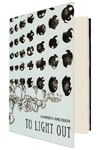William Blake took dictation from “devils” and Jack Spicer compared the source of poetry to an otherworldly radio. Karen Weiser, too, seeks a “knowledge beyond conscious experience,” a poetic language so singular that it sounds nothing like the language of expository prose. Her foreword makes clear her dependence on Spicer, but her poetry never sounds like his. It’s more euphonious and a lot more fun, and it’s in part (she says) a response to motherhood and pregnancy. Instead of Spicer’s mystical “practice of outside,” Weiser has had another human being gestating “inside”: “You yourself are the egg-cup,” she writes, “putting both constitutions together one / smoke signal at a time.”
Pregnancy and motherhood put pressure not only on Weiser’s metaphors but on her sense of time: “In its minute bumping against the walls / the future’s at the center of every room.” At “The Birth End of the Conflagration,” “your body / (doorframe qualified as earthquake) / speaks to another without / your thinking it.” Only perhaps half the poems seem connected to parenthood in such thematic ways.
Baby-related or not, Weiser’s figures of speech are gloriously two-headed and unpredictable, even purposefully giggly or silly: “The Plant Must Grow Tired, and I Very Sleepy” speaks on behalf of a talking potato. But the silliness and the magical here are inseparable, since both are opposed to the straightforward prose use of words: the “moment of opening between us” occurs when Weiser banishes that use in order to make space for something else—often enough, for a language of dreams, for “the natural history of the island of sleep.” Another one of her titles names her working methods: “Having Dragged My Shelf of Sleep Like One Drags a River for Possibilities.”
Self-entangled or crisp, dreamy or else charged with an “antidote to dreaming / inside the accident prone glass dolls” of our bodies, Weiser’s poems are rife with arrestingly quotable, sometimes comic figures of speech: “Americana seduction like original face paint / reflected in a gridiron puddle.” I think that’s the face of a defeated football player, but I can’t be sure—I don’t want to be sure. Weiser’s best poems make stellar examples for T. S. Eliot’s famous claim that true poems can communicate before they are understood: “slam the book, put down the violin,” Weiser requests, “and warm your exhausted proboscis / in the trestle bed of an emotional fire.”
That “proboscis” sticks out,...
You have reached your article limit
Sign up for a digital subscription and continue reading all new issues, plus our entire archives, for just $1.50/month.
Already a subscriber? Sign in





